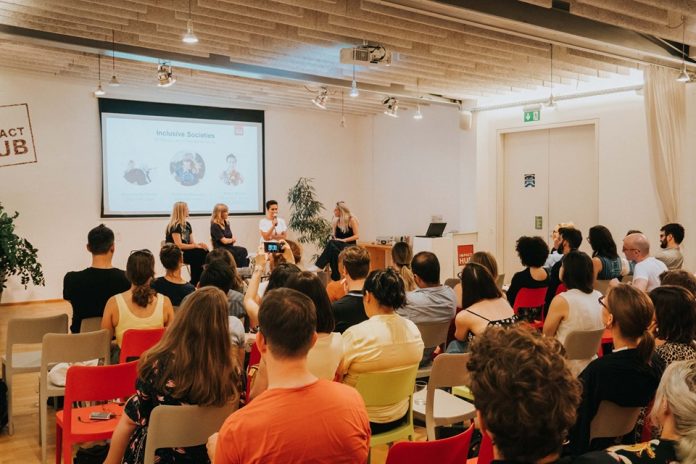In the long run, the empowerment of women refugees and migrants means investing in the future because simultaneously while empowering them, the same process happens to the society as a whole.
During the process of social inclusion, certain common characteristics of a person become evident, for example their need to adapt to a new cultural environment with different customs and different socially acceptable behaviour patterns.
Women whose work connected marginalized groups, innovations and entrepreneurship, some of them came to Austria as migrants, gathered at the panel event WineDown: Inclusive Societies in the Impact Hub Vienna on 27th June 2019.
Andra Slaats, one of the panellists, is the founder of Younited Cultures, a fashion brand that celebrates diversity and highlights positive aspects of migration. Slaats said that where she came from girls were taught to be silent and not dream a lot, while working on various empowerment programs she made people involved in such projects discover their talents and develop new skills. For example, she is the activist of the Mädchenbeirat project launched by Hil-Foundation, which supports people in a disadvantaged position with regard to the possibilities of organizing their own lives. The focus of this organization is directed towards children and adolescents, girls and women, and people with psychological impairments, and the said project is intended to empower women. In her presentation, Andra Slaats reconsidered the wrong approach to migration as an inevitable social phenomenon in today’s world.
It is worrisome to note that we are still discussing migration as a negative trend and I would like to change the other side that is still not ready for dialogue. Refugees and migrants are mostly young people who will invest in the economy, and journalists and media play a major role in this process as mind-altering drivers.
Katha Schinkinger is a partner at Habibi & Hawara restaurant & catering service, whose employees are refugees and migrants. Besides employment, they also have the opportunity to acquire professional training which can be useful once they become independent entrepreneurs themselves. Schinkinger also addressed the fact that there was still a noticeable lack of women employed in gastronomy.
We want to increase the number of women employed in gastronomy because it is necessary to empower them, but also to increase the number of young people, especially those with a migration background. I believe everybody can make a change, and an example is a girl from Sweden, a sixteen-year-old teenager, Greta Thunberg, who, protesting in front of the Swedish Parliament has brought a lot of public and media attention to climate changes.
Annamaria Tolvaly, who has opened an atelier and shop Bags with Legs, believes that each person can be a wheel of change in public policy and social programmes. The beginning was not easy for her because she was unemployed or had no money, but she started designing bags and at the same time looking for ways to make the project sustainable. Production materials, mainly leather and water-repellent vegan materials, are supplied in Austria, and women producing them are also offered training and thus she spends most of her time with them.
I grew up in communism, in a system where you had to use your own hands to create something. That is why I have always been very familiar with the sewing machine, and the knowledge passed down from my mother and grandmother to me, I use today. Besides, I notice a strong consumerism in which people do not think what they buy. Austrian market is competitive and refugee and migrant women coming from different cultures must adapt very quickly to this dynamic environment.
Francis Rafal, a young entrepreneur who is currently running different ventures, asked the audience during the introductory panel to answer the question, each one separately using their mobile device, “How willing are you to express your own affection for someone / something based on your thinking and attitudes compared to the average Austrian?” The result of this brief survey showed that just over 10% of respondents considered themselves to be more willing for such treatment, and the same proportion of 40% of respondents considered themselves equally willing or less willing to express their affection based on their own opinion compared to the average Austrian.
Based on these results, as well as other indicators confirming such results, Rafal concluded:
It is important to be aware that sometimes we tend to adhere to the prevailing attitudes more than we think, because that awareness enables us to deeply assess the people around us. Few of those with whom we spend very much of our time affect us and our vision of society, therefore, affect the way in which every individual shapes themself personally.
After the panel events, during an informal gathering, non-governmental organizations and carriers of social projects from Albania, Bosnia and Herzegovina, Kosovo, Macedonia and Serbia presented their work.












